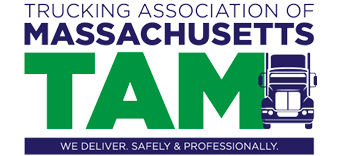TAM Testimony – In support of S.1759 & H.2517, relative to the taxation of rolling stock
On May 7, Kevin Weeks, the executive director of the Trucking Association of Massachusetts, submitted written testimony in support of Senate Bill 1759 and House Bill 2517, relative to the taxation of rolling stock. The testimony is provided below, and a PDF is available for download.
For additional information, contact the Trucking Association of Massachusetts.
Honorable Mark Cusack, House Chairman
Honorable Adam Hinds, Senate Chairman
Joint Committee on Revenue
State House Room 34
Boston, Massachusetts 02133
Dear Chairman Hinds, Chairman Cusack and Members of the Committee:
On behalf of the over 250 member companies of the Transportation Association of Massachusetts (TAM), I am writing to urge your strong support for Senate Bill 1759 / House Bill 2517, relative to the taxation of rolling stock. This legislation, which received a favorable from this Committee last session, will create an exemption from the Massachusetts sales and use tax as applied to rolling stock. The legislation will also encourage trucking companies, which provide numerous jobs with competitive salaries, to remain in the Commonwealth while upgrading their fleets to cleaner and safer trucks. Accordingly, I respectfully urge you to issue a favorable report to Senate Bill 1759 / House Bill 2517.
As you know, TAM has been the voice of the trucking industry in Massachusetts since 1919. One of the oldest transportation associations within the Commonwealth, we represent a wide variety of companies ranging from small, family owned trucking companies with a single truck to large national trucking companies with thousands of trucks. The trucking industry within the Commonwealth is responsible for transporting 87%-93% of all goods and products found in our homes and workplaces. In addition to being a key facilitator for the growth of other industries, the trucking industry is a significant creator of jobs within the Commonwealth. As a recent study by the Dukakis Center for Urban Research & Policy at Northeastern University stated “[t]he overall trucking industry (including private and for-hire tucking) represent about one in 12 jobs or about 300,000 jobs in Massachusetts in 2017. And, trucking companies meet all Massachusetts freight movement needs.” (“The Importance of the Trucking Industry to the Massachusetts Economy”, Pritchard, R. & Scott, A., p.3 (May 2018)).
The commercial trucking industry within the Commonwealth has seen the as decline as many trucking companies have moved to other states. Part of the reason that trucking companies have left the state is due to the Commonwealth’s tax policies. In particular, the Massachusetts Department of Revenue has begun collecting sales and use tax for rolling stock purchased in other states which have an exemption in place for rolling stock. As a result, any company with a substantial nexus with the Commonwealth is being charged sales and use tax by the Commonwealth even though the rolling stock was purchased in other states. Accordingly, various truck companies, who may be domiciled in Massachusetts or have repair facilities in Massachusetts, are now seeking to locate them outside of the state to reduce the substantial nexus necessary to collect such tax.
Senate Bill 1759 / House Bill 2517 seeks to bring Massachusetts in line with a majority of other states (37) within which an exemption from sales and use tax for rolling stock already exists. As drafted, this legislation amends Mass. Gen. Laws ch. 64H (i.e. sales tax) and Mass. Gen. Laws ch. 64I (i.e. use tax) to specifically exempt rolling stock from the sales and use tax. “Rolling stock” is defined as “trucks, tractors, and trailers, used to transport goods in interstate commerce”. The legislation does not allow a motor carrier to avoid paying the multitude of fees otherwise required under federal, state and local law. According to a study conducted by the Dukakis Center for Urban Research & Policy, the elimination of the sales and use tax on rolling stock will, following national trends, create “2,768 more employees and 2,076 more power units … operating and generating an additional $15.9 million in tax revenue per year; while not estimable, … the impact on private fleets may be just as large.” (“The Importance of the Trucking Industry to the Massachusetts Economy”, Pritchard, R. & Scott, A., p.14 (May 2018)).
The need for this change to the law cannot be overstated. First, Senate Bill 1759 / House Bill 2517 will create a more attractive environment for trucking companies to remain in the Commonwealth. Trucking companies rely on constantly maintaining and upgrading their equipment. This means purchasing new rolling stock on a regular basis. On the other hand, if they know that their out-of-state purchases will incur an in-state tax, the companies will work to reduce their nexus to the taxing state. As it stands, Massachusetts trucking companies are put at a competitive disadvantage when competing against carriers located in the neighboring states.
Second, by keeping trucking companies in the Commonwealth, the good jobs and competitive salaries that these companies offer will remain within the state. According to the United States Bureau of Labor Statistics, Massachusetts has the fourth highest annual mean wage for heavy and tractor-trailer drivers within the country. (See http://www.bls.gov/oes/current/oes533032.htm). If more trucking companies find Massachusetts tax policy less favorable than neighboring states, it is likely the decrease in Massachusetts trucking companies will become even more significant.
Third, if the Commonwealth discourages trucking companies from domiciling in the state, transportation expenses will rise — further impacting the high cost of living already experienced in the Commonwealth. The costs associated with transporting goods are fairly straightforward. (See http://www.atri-online.org/wp-content/uploads/2014/09/ATRI-Operational-Costs-of-Trucking-2014-FINAL.pdf). If the Commonwealth’s tax policies cause trucking companies to domicile elsewhere, the additional fuel, tolls and vehicle maintenance, among other costs, will be borne by Massachusetts residents and businesses that already rely on the industry for 87% of their goods.
Fourth, the passage of Senate Bill 1759 / House Bill 2517 will encourage the purchase of new equipment with the latest technology available. This is turn will support increased public safety and create additional environmental benefits. In terms of public safety, new trucks include lane-departure, crash collision and speed regulator technology that improves road safety. In terms of environmental benefits, newer trucks have more efficient engines and exhaust systems. This leads to greater fuel efficiency and reduces emissions of NOx and particulate matter to further support the Commonwealth’s fuel efficiency and clean air efforts.
This legislation is a matter of common sense. If a company does not purchase a product within State (A), it is not fair for State (A) to tax the company for purchasing a product in State (B). The purpose of taxes and fees is to support the mechanisms that help the taxpayer. (i.e. road and bridges, police, fire, etc.). In the case of the trucking industry, gas taxes, tolls, vehicle registrations and other license fees and taxes cover the expense of the trucking industry. Collecting sales and use tax on rolling stock purchased in other jurisdictions creates a disincentive for companies to expand in the Commonwealth or bring new equipment to this state. Given that neighboring states such as New York, Rhode Island, Connecticut, New Hampshire and Vermont (partial) exempt rolling stock from sales and use tax, Massachusetts’ current tax policy will simply lead to higher costs for Massachusetts residents and businesses while driving economic opportunity to neighboring states.
On behalf of the thousands of men and women in Massachusetts who rely on the good jobs and competitive salaries these Massachusetts companies provide, I respectfully urge you to adopt Senate Bill 1759 / House Bill 2517, relative to the taxation of rolling stock. I appreciate your consideration of this important matter. If you have any questions or concerns, please do not hesitate to let me know.
Sincerely,
Kevin Weeks
Executive Director

